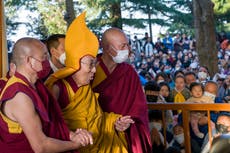Dalai Lama: The significance of ‘tongue greetings’ in Tibetan culture
No ‘sucking’ involved in Tibetan tradition of sticking out tongue in greeting
The Dalai Lama has been defended by his supporters online after a video showed him kissing a boy on the lips and asking him to “suck his tongue”, with some arguing that the exchange can be partly explained by Tibetan culture.
The leader of Tibetan Buddhism did not make any reference to Tibetan traditions in his own statement after the incident, where he publicly apologised to the boy and his family and said he “regrets the incident”.
“The Dalai Lama often teases people he meets in an innocent and playful way,” the statement said.
“His Holiness wishes to apologise to the boy and his family, as well as his many friends across the world, for the hurt his words may have caused.”
Many have criticised the Dalai Lama over the incident, which was called out in reactions online as being “inappropriate” and “disgusting”. Some commentators and victims’ groups have compared the spiritual leader’s conduct to “child abuse”.
Some Tibetan activists, however, have argued that the incident is one of a “joke” being overblown, while others suggested the Dalai Lama was being attacked over “[a] Tibetan way of expression”.
“At [the] Dalai Lama’s temple, a child asked him if he could hug Dalai Lama & he said yes, then he asked for a kiss & Dalai Lama did a kiss, then jokingly Dalai Lama said ‘you can suck my tongue’. So that was a part of a joke or just a play with the kid, so we should not go more than that,” said Dawa Tsering, a member of the Tibetan Parliament In Exile which, like the Dalai Lama himself, is based in Dharamshala, India.
“Expression of emotions and manners today has been melted together and become vividly westernised,” Namdol Lhagyari, a Tibetan activist in exile, wrote on Twitter. “Bringing in narrative of other cultures, customs and social influence on gender and sexuality to interpret Tibetan way of expression is heinous.”
What is the Tibetan culture of tongue greetings?
Sticking out your tongue is traditionally a sign of respect or agreement and has also been used as a greeting in Tibetan culture, according to the Institute of East Asian Studies at the University of California, Berkeley.
Perhaps the most famous Western cultural reference to this tradition comes in the film Seven Years in Tibet starring Brad Pitt, where Pitt’s character encounters a group of children who stick out their tongues at him. The film offers no further explanation of their actions.
According to Tibetan folklore, people in the Buddhist culture began sticking out their tongue to disassociate themselves from the 9th century Tibetan king Lang Darma, who was infamous for his cruelty and was said to have had a black tongue.
As Buddhists believe in reincarnation after death, the tradition is said to have emerged as a way for people to show they were not the king reincarnated and therefore not to be associated with his evil deeds.
However, there is no mention in either this folklore or the broader traditional greeting of sucking the tongue.
What does the video show?
The video that has been widely circulated on social media shows the Dalai Lama kissing a young Indian boy on his lips after he came forward to pay his respects. The Dalai Lama’s statement claims the boy voluntarily stepped forward during a public question and answer session where he had asked if he could hug the spiritual leader.
After holding the boy’s chin and kissing him, the Dalai Lama touches foreheads with the boy and then can be heard saying, in English, “can you suck my tongue”. He then sticks out his tongue as the boy leans forward briefly.
Child rights activist Shola Mos-Shogbamimu said we should not normalise child molestation under the garb of playful behaviour with children.
“This is NOT playful banter & so inappropriate to use ‘affectionately plants kiss’ alongside ‘suck my tongue’. Hugs are fine not this. Don’t normalise molestation of kids - don’t care how revered the Dalai Lama is I’m not OK with a child sucking a grown man/woman/anyone’s tongue,” she said.
Nilanjana Bhowmick, an Indian journalist and commentator, said “there is a difference between sticking out your tongue and asking a minor to suck it!”





Join our commenting forum
Join thought-provoking conversations, follow other Independent readers and see their replies
Comments